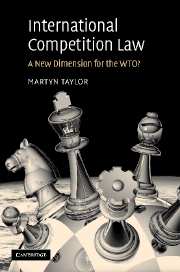Book contents
- Frontmatter
- Contents
- List of tables and figures
- List of abbreviations
- 1 Introduction
- PART I An International Competition Agreement is Desirable
- 2 Is competition law beneficial?
- 3 Is an international competition agreement desirable?
- 4 Is there a sufficient basis for an international competition agreement?
- 5 Have existing cross-border initiatives proved sufficient?
- PART II The WTO Would Provide a Suitable Institutional Vehicle
- PART III The Optimal Form for a WTO Competition Agreement
- APPENDIX: Draft negotiating text for a plurilateral WTO competition agreement
- Index
3 - Is an international competition agreement desirable?
Published online by Cambridge University Press: 17 July 2009
- Frontmatter
- Contents
- List of tables and figures
- List of abbreviations
- 1 Introduction
- PART I An International Competition Agreement is Desirable
- 2 Is competition law beneficial?
- 3 Is an international competition agreement desirable?
- 4 Is there a sufficient basis for an international competition agreement?
- 5 Have existing cross-border initiatives proved sufficient?
- PART II The WTO Would Provide a Suitable Institutional Vehicle
- PART III The Optimal Form for a WTO Competition Agreement
- APPENDIX: Draft negotiating text for a plurilateral WTO competition agreement
- Index
Summary
We have seldom seen neighbourhood affection among nations. The reverse is almost the universal truth.
(Thomas Jefferson, 1803)Chapter 2 concluded that competition law is beneficial. Chapter 3 now considers whether an international competition agreement would be desirable. Chapter 3 undertakes this task in the following manner:
Section 3.1 outlines how trends in globalisation and multinational corporate expansion have exacerbated the risk of cross-border anti-competitive conduct. Such conduct is not currently regulated effectively on an international basis. Section 3.1 identifies that cross-border spillovers (or ‘externalities’) provide an important policy justification for an international competition agreement.
Section 3.2 identifies the current approach of the international community to the regulation of cross-border anti-competitive conduct, namely via the extraterritorial application of competition laws. Section 3.2 identifies inherent difficulties in an extraterritorial approach, including jurisdictional conflict.
While beyond the scope of this book, this chapter also identifies a number of economic models which conclude that greater international co-ordination of competition law would be welfare enhancing where each nation enforces its competition laws on an extraterritorial basis in accordance with its national self-interest. Chapter 3 therefore establishes that an international competition agreement is desirable and would be welfare enhancing relative to the status quo.
The globalisation of competition
Globalisation of the international economy
Over the last three decades the world has experienced a period of unprecedented economic integration. World trade as a proportion of global production increased from some 10% in 1970, to 34% by 2000.
- Type
- Chapter
- Information
- International Competition LawA New Dimension for the WTO?, pp. 34 - 70Publisher: Cambridge University PressPrint publication year: 2006



